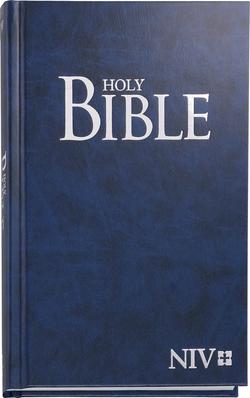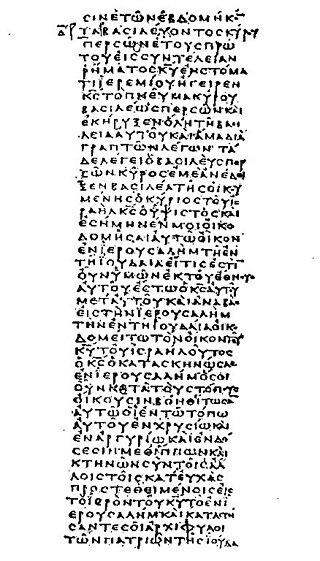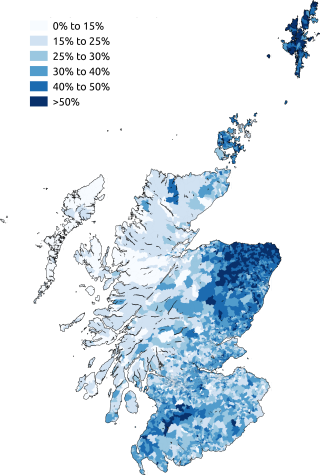Related Research Articles

The King James Version (KJV), also the King James Bible (KJB) and the Authorized Version (AV), is an Early Modern English translation of the Christian Bible for the Church of England, which was commissioned in 1604 and published in 1611, by sponsorship of King James VI and I. The 80 books of the King James Version include 39 books of the Old Testament, 14 books of Apocrypha, and the 27 books of the New Testament.

The New International Version (NIV) is a translation of the Bible into contemporary English. Published by Biblica, the complete NIV was released in 1978 with a minor revision in 1984 and a major revision in 2011. The NIV relies on recently-published critical editions of the original Hebrew, Aramaic, and Greek texts.

The Septuagint, sometimes referred to as the Greek Old Testament or The Translation of the Seventy, and often abbreviated as LXX, is the earliest extant Greek translation of the Hebrew Bible from the original Hebrew. The full Greek title derives from the story recorded in the Letter of Aristeas to Philocrates that "the laws of the Jews" were translated into the Greek language at the request of Ptolemy II Philadelphus by seventy-two Hebrew translators—six from each of the Twelve Tribes of Israel.

Doric, the popular name for Mid Northern Scots or Northeast Scots, refers to the Scots language as spoken in the northeast of Scotland. There is an extensive body of literature, mostly poetry, ballads, and songs, written in Doric. In some literary works, Doric is used as the language of conversation while the rest of the work is in Lallans Scots or British English. A number of 20th and 21st century poets have written poetry in the Doric dialect.

Scots is an Anglic language variety in the West Germanic language family, spoken in Scotland and parts of Ulster in the north of Ireland. Most commonly spoken in the Scottish Lowlands, Northern Isles, and northern Ulster, it is sometimes called Lowland Scots to distinguish it from Scottish Gaelic, the Goidelic Celtic language that was historically restricted to most of the Scottish Highlands, the Hebrides, and Galloway after the sixteenth century; or Broad Scots to distinguish it from Scottish Standard English. Modern Scots is a sister language of Modern English, as the two diverged independently from the same source: Early Middle English (1100–1300).

The Bible has been translated into many languages from the biblical languages of Hebrew, Aramaic, and Greek. As of September 2023 all of the Bible has been translated into 736 languages, the New Testament has been translated into an additional 1,658 languages, and smaller portions of the Bible have been translated into 1,264 other languages according to Wycliffe Global Alliance. Thus, at least some portions of the Bible have been translated into 3,658 languages.

Parts of the Bible have been translated into Welsh since at least the 15th century, but the most widely used translation of the Bible into Welsh for several centuries was the 1588 translation by William Morgan, Y Beibl cyssegr-lan sef Yr Hen Destament, a'r Newydd as revised in 1620. The Beibl Cymraeg Newydd was published in 1988 and revised in 2004. Beibl.net is a translation in colloquial Welsh which was completed in 2013.
Scottish Bible Society (SBS), founded in 1809 as the Edinburgh Bible Society, amalgamated in 1861 with the Glasgow Bible Society to form the National Bible Society of Scotland, is a Scottish Christian charity that exists to make the Bible available throughout the world.

The term Catholic Bible can be understood in two ways. More generally, it can refer to a Christian Bible that includes the whole 73-book canon recognized by the Catholic Church, including some of the deuterocanonical books of the Old Testament which are in the Greek Septuagint collection, but which are not present in the Hebrew Masoretic Text collection. More specifically, the term can refer to a version or translation of the Bible which is published with the Catholic Church's approval, in accordance with Catholic canon law.
Arabic translations of the Bible constitute one of the richest traditions of Bible transmission. Translations of the Bible into Arabic were produced by Arabic-speaking Jews, Christians, and Samaritans. Even though Arabic was spoken by Jews and Christians before the advent of Islam, running Arabic translations of the Bible are attested in manuscripts only from the 9th century CE onwards. So far, no evidence could be adduced that Arabic Bible translations were available at that time. Before that, quotations from the Bible were used in Arabic especially by Christians.

Peter Hately Waddell was a Scottish cleric and prolific writer. He founded a congregation he called the "Church of the Future". He also wrote widely on aspects of Scottish culture and ancient Celtic history, sometimes espousing distinctly non-mainstream views.

That part of the United Kingdom called Northern Ireland was created in 1922, with the partition of the island of Ireland. The majority of the population of Northern Ireland wanted to remain within the United Kingdom. Most of these were the Protestant descendants of settlers from Great Britain.
Translations of the Bible into Irish were first printed and published in the 17th century: the New Testament, the Tiomna Nuadh, in 1602, the Old Testament, the Sean Thiomna, in 1685, and the entire Bible, the Biobla in 1690.
While the Old Testament portion of the Bible was written in Hebrew, the New Testament was originally written in Koine Greek. The Greek language, however, has several different dialects or denominations. This required several different translations done by several different individuals and groups of people. These translations can be categorized into translations done before and after 1500 AD.
The New Testament was first published in Scottish Gaelic in 1767 and the whole Bible was first published in 1801. Prior to these, Gaels in Scotland had used translations into Irish.
Edith Anne Robertson was a Scottish poet who wrote in both the English and Scots tongues.
William Duff McHardy, CBE was a Scottish scholar of Biblical languages. From 1960 to 1978, he was Regius Professor of Hebrew at the University of Oxford. He contributed to the New English Bible, and was director of the Revised English Bible.
The Psalms: frae Hebrew intil Scottis is a translation of the book of Psalms into Scots by Peter Hately Waddell, first published in 1871. It is notable for being the first translation into Scots from an original biblical language, rather than from a pre-existing English translation.
Isaiah: frae Hebrew intil Scottis is a translation of the Book of Isaiah into Scots by Peter Hately Waddell, first published in 1879. Like his earlier translation of the Pslams, the book is notable for being translated directly into Scots an original biblical language, rather than from a pre-existing English translation.
References
- ↑ Vincent, Helen (3 November 2010). "The first Scottish printed Bible". Rare Books @ NLS. Edinburgh: National Library of Scotland . Retrieved 26 September 2012.
- ↑ G. Tulloch (1989). A history of the Scots Bible.
- ↑ The Psalms in Scots : reprint of P Hately Waddell's The Psalms: frae Hebrew intil Scottis. Waddell, P. Hately (Peter Hately), 1816-1891. Aberdeen: Aberdeen University Press. 1987. ISBN 0-08-035075-5. OCLC 16080959.
{{cite book}}: CS1 maint: others (link) - ↑ "The Psalms frae Hebrew intil Scottis – Wee Windaes". Archived from the original on 10 September 2019. Retrieved 23 August 2020.
- ↑ Scotland, The Church of (21 June 2023). "Retired solicitor completes 17-year translation of the Bible into Doric". The Church of Scotland. Retrieved 13 April 2024.